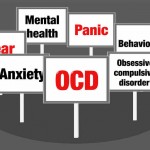
Linda Papadopoulos – Psychologist
With the Golden Globes and this Sunday’s BAFTAs now done and dusted, the film world now turns its attention to the Oscars. Among those shortlisted for this year’s Best Picture category include two films which deal with the taboo subject of mental illness, and how it affects those around us – namely, award winning director, David O. Russell’s Silver Linings Playbook and Michael Haneke’s Amour.
These two nominations follow on from a tradition of breakthrough films which deal with the challenging and complex nature of mental illness – films such as One Flew Over the Cuckoos Nest, The Hours, Betty Blue – original and different films in their own rights, which are brought together by their willingness to tackle issues of mental health.
Whereas health problems such as diabetes and high blood pressure are very much in the public vernacular, why is there is still such a stigma around issues such as bipolar depression? Despite research showing that one in four of us will experience mental illness at some point in our lives, bipolar depression still provokes prejudice, especially in the workplace. Job applications frequently ask potential employees to declare treatment for a mental illness. Those who answer truthfully are invariably unsuccessful and those in work who report mental illness can find themselves passed over for promotion. As a result many people with mental illness experience rejection, unemployment and a sense of social isolation through no fault of their own. Fewer than 20 per cent manage to hold down a job, according to patient advocacy groups.
With so much misunderstanding and social stigma attached to mental illnesses such as bipolar disorder and dementia, will the success of these films help to raise awareness of these conditions? Dr Linda Papadopoulos joins us now to discuss the powerful effect films can have in raising complex issues…
Teekshana Smith interviews Dr Linda Papadopoulos on behalf of PatientTalk.Org
SMITH: Thank you so much for doing this
DR PAPADOPOULOS: My pleasure
SMITH: The first question is: mental illness has been a key subject matter of films since such expressionist cinema for example Doctor Caligary. Can you trace the changes in portrayals of people with mental health conditions since then?
DR PAPADOPOULOS: Well I think one of the most fundamental differences is where the focus is on so if we kind of think of movies like Cuckoo’s Nest for example which was seminal at the time, the focus was much more on institutionalisation, it was focussed much more on treatment, the focus was on to some extent the ostracisation , the vilification of the mentally ill. And then if you fast forward to things like Silver Linings Playbook today, the focus is much more on the individual rather than the institution and much more this idea that even though my mind might have these idiosyncrasies my illness may be idiosyncratic but actually mentally what I want, what I desire is the same thing as you and everyone else. It’s to be loved, it’s to be accepted, it’s to have hope. So I think what you tend to see are changes that kind of run accord with what changes in society. So yes, we’ve worked a lot on patient care and treatment, not to say we don’t have a long way to go, but I think what’s happened since is that we’ve lost this idea that it is about the individual and an individual isn’t their illness, isn’t defined by it, shouldn’t be and I think that’s what was so poignant about this film.
SMITH: And you just touched upon treatment, do you think the treatment now is more or less positive than it has been in previous decades?
DR PAPADOPOULOS: I think certainly. We started off at Bedlam right, and now we’re here so do I think it’s more positive? Yes. Do I think there’s significant room for improvement? Yes. I think we’re learning every day consistency of patient-practitioner interaction I think is one of the big issues that we still need to look at. I think simply because of the way the system is set up and budget cuts that people will see several practitioners and have to tell their story over and over again, that continuity sometimes isn’t there, I think that could help. I think also because of the economic state, that people perhaps are offered medication much more quickly than they are offered psychological support and counselling. I think it would be great to get to a point where they could be offered what they need, both, rather than the easiest or the most cost effective route out. But I do think having said that, that there is definitely the will and the desire to give people the services that are right for them.
SMITH: And as you mentioned it has become more positive, do you think this is just a by-product of general changes in social attitudes?
DR PAPADOPOULOS: I do but I think there’s still a long way to go. I think the reason that Silver Linings made such an impact on me anyway is because I haven’t seen such a realistic portrayal of mental illness. It tends to be very much caricatured or you tend to hear about it in the newspaper when someone with mental illness has done something terrible and hurt someone or themselves. So very rarely do you see it like this. So is society changing? Yes. Is it fast enough? In my opinion, no because there’s still a big difference in the way that we treat a physical illness and a mental one. It’s very simple, people are much more comfortable to go to their doctor and talk about a sore neck or a sore back than they are to talk of depression when in fact we know that a significant proportion of people who go to the doctor with physiological ailments are there because of psychological ailments but are afraid to seek about them. We know that there was a recent study done with over 35 countries, over a thousand people, 75% of which said they felt ostracised because of their illness. So there’s a lot of room for improvement still in society and how we see conditions like this.
SMITH: So are films made by people with mental health problems rather than about the issues? If so which ones would you recommend?
DR PAPADOPOULOS: I think one of the reasons that this film is as good and as genuine as it is, is that David O. Russell the director actually made it for his son, his son has OCD and I think, one of the entries I was reading is something to the effect of that his son was feeling that he didn’t belong, that he wasn’t being portrayed anywhere in an honest way and I think you can see the small nuances within it, that very much attest to this. I do think people that who have first-hand experience of issues should absolutely be speaking about them, and be writing about them, and making movies about them, and making shows about them, absolutely.
SMITH: How can films and books be used to help children and family members understand a loved one’s condition?
DR PAPADOPOULOS: I think it’s like when you are trying to get your child to eat vegetables and you sneak some carrots inside the carrot cake so that they can still enjoy it and that’s why I think movies like Silver Linings Playbook, like those movies out there, even like the Kings Speech that kind of portray conditions but portray them in a genuine way are really important in helping us understand we are being entertained but at the same time a mirror is held up to the condition and likewise there is wonderful books out there, whether it is about autism or whether it is about disharmony within a family there’s a lot out there and I think when it is in literature, when it is in movies it feels somehow, more digestible. So I do think absolutely, they hold a place but likewise I think amasing charities like Mind hold a place if you want to find out about what’s happening to you or a close family member and I think regardless of where we are getting our information from I think what’s important is we are getting it from as many different places as possible but the message is consistent, that mental illness is not something to be ashamed of, it’s something to be treated like any other condition.
SMITH: A common criticism of these films is that they are made to be watchable and they have to create extreme and unrealistic situations and scenarios which reinforce prejudice and stereotypes. Do you think that’s a valid criticism?
DR PAPADOPOULOS: Certainly not in the case of this movie. I think if anything there wasn’t that sensationalisation of the condition or even of the relationships. I think certainly it is entertaining and fun and there are wonderful moments in it but I think the fundamentals they really got right. They were very honest, the fear of being sick, the fear of not really knowing all of your child’s or your child not knowing all of you. The fear of living with a condition that you haven’t named in the case of the father I think all of this was very true.
SMITH: Is not the work of somebody like Silvia Plath in say The Bell Jar, a better way of representing of mental illness?
DR PAPADOPOULOS: No, not necessarily I think both have a place. I think that that’s the point that both have a place. I think that if you become ‘preachy’ from want of a better word. I think that some people find it interesting I think it turns other people off. I think likewise movies like this will hit a truth with a lot of people where as The Hours would hit a truth with other people. I think the whole point is though, is it’s a genuine, positive portrayal from a director who had direct, intimate experience of an issue and you can see this. So I don’t worry that you can watch this movie and enjoy it and laugh and I think that there is absolutely nothing wrong with that, in fact I think that’s probably better than just having a documentary at times, not saying that there is not a place for both but I think certainly this will get through to a lot of people. The whole point of movies like this I think, is at least part of the point of them is it gets people talking and I think the more we talk the less that shame exists and the less that shame exists the more likely people are to seek out the support that they need and I think that this is what it is all about.
SMITH: Fantastic. Is there anywhere people can go for more information?
DR PAPADOPOULOS: If they go onto the Mind website or even get a number and speak to someone there. There are some amasing people who do great work there.
SMITH: Thank you so much, for doing this today.
DR PAPADOPOULOS: Pleasure, it’s a pleasure

